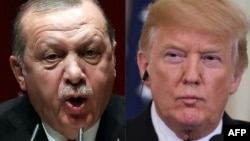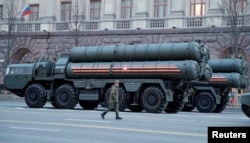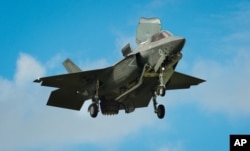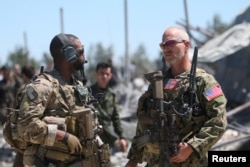U.S. President Donald Trump spoke with his Turkish counterpart Recep Tayyip Erdogan in an effort to resolve escalating tensions after Ankara said it intended to acquire the S-400, an air and missile defense system, from Russia.
In readouts, both leaders acknowledged they discussed the controversial missile system. The statements were devoid of recent fiery rhetoric that has increasingly characterized discussions over the Russian weapon purchase.
During his telephone conversation with Trump, Erdogan proposed setting up a joint commission to resolve the dispute.
"Our honorable president brought up the proposal to establish a working group regarding the procurement of the S-400 defense system from the Russian Federation," the Erdogan statement said.
Ankara's proposal has been met with a lukewarm response from the U.S. Pentagon and the U.S. State Department. There has been no comment on how Trump reacted to Erdogan's proposal.
Throughout the escalating tensions between Ankara and Washington, neither Erdogan nor Trump have publicly attacked one another. An international relations analyst suggests Ankara could be banking on resolving current tensions.
"Trump and Erdogan, only they can solve this kind of problems," said international relations professor Huseyin Bagci of Ankara's Middle East Technical University. "As long as Trump doesn't say anything hostile, there is always a way out of this."
Economic repercussions
However, time could be running out. The Russian missiles are due to be delivered to Turkey in July, a delivery date confirmed by Moscow this month. Congress is warning the delivery of the missiles could likely trigger significant financial sanctions under the Countering America's Adversaries Through Sanctions Act.
The delivery of America's F-35s to Turkey is also under threat, along with Ankara's role in producing the jets. Turkey is a production partner in the aircraft, which is worth several billion dollars to Turkish companies.
Erdogan played down the threat Tuesday, declaring the removal of Turkey from the F-35 program would result in a collapse of the project. Analysts suggest such claims are exaggerated but admit it would likely result in production delays until alternative producers are found.
Observers say a damaging showdown between Ankara and Washington is looming.
"U.S. Vice President [Mike] Pence said even Turkey's membership in NATO is in question, so we are in very dire straits now," said former senior Turkish diplomat Aydin Selcen, who served in Washington.
The rising tensions are already taking a toll on the Turkish lira, which has suffered heavy falls this year. Dwindling foreign reserves have been depleted by the Turkish Central Bank who used the reserves to shore up the beleaguered lira. That is fueling international investors' concerns over whether Ankara can withstand a showdown with Washington.
"There is a serious question about the central bank's ability to defend the lira against any domestic or foreign policy shock," said analysts Atilla Yesilada of Global Source Partners.
Concerns regarding Syria
Erdogan and Trump also discussed northern Syria and Turkey's security concerns.
Ankara is threatening to launch a military offensive against the Syrian Kurdish militia the YPG, which is a key American ally in its war against the Islamic State. Turkey designates the YPG as terrorists linked to an insurgency inside Turkey.
Until now, Ankara has held off its threat to attack. Senior U.S. diplomats are visiting the Turkish capital for talks on resolving the current impasse.
Analysts suggest a grand bargain between Ankara and Washington can still be reached.
"I think ultimately Ankara's actions are a move to get more leverage on the United States, but Turkey is making many mistakes now," said Bagci.
"President Erdogan has said the deal is done [purchasing Russian S-400 missiles], but he [Erdogan] can change his mind, in the last minute," Bagci added. "I can still expect Turkey can make a maneuver not to buy the S-400. Turkey cannot afford to confront all the NATO countries; Turkey cannot afford the consequences. However, I don't know what compromise Turkey will have to make Russia."
Moscow has considerable leverage over Ankara. Russian forces held off launching a military offensive with the Syrian regime against the last rebel enclave in Syria's Idlib province. The province borders Turkey, and any attack would likely lead to hundreds of thousands of refugees fleeing to Turkey.
On Monday, Moscow again raised the prospect of an attack on Idlib.
"We will think [about how to solve the problem]. It may be necessary to use the capabilities of our aerospace forces or international forces. The problem will have to be solved sooner or later," said Alexandre Lavrentyev, Russian presidential envoy for Syria.








